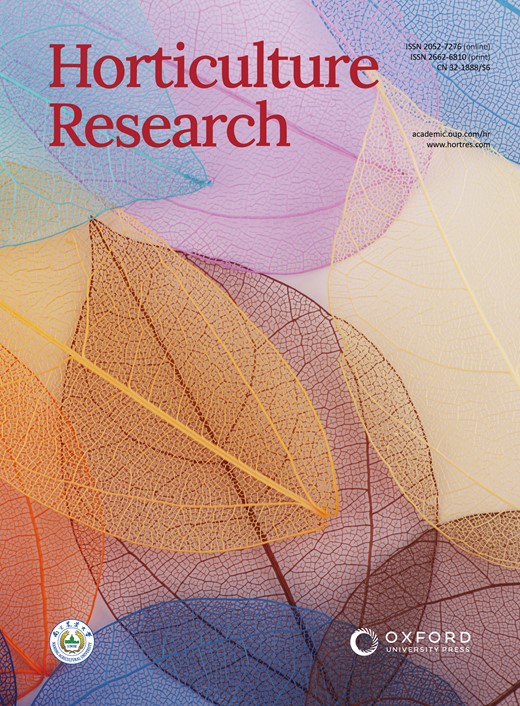High-resolution genetic map and SNP chip for molecular breeding in Panax ginseng, a tetraploid medicinal plant
IF 8.5
1区 农林科学
Q1 Agricultural and Biological Sciences
引用次数: 0
Abstract
Ginseng (Panax ginseng) renowned as the king of medicinal plants. Ginseng grows slowly under shade conditions, requiring at least four years to produce a limited number of seeds. Molecular breeding of ginseng faces challenges due to its the tetraploid genome and the absence of an efficient molecular marker system. To overcome these obstacles, we adopted genotyping-by-sequencing to delve into genetic mapping and survey genetic diversity. We constructed a comprehensive genetic map comprising 24 linkage groups, each corresponding to one of the 24 chromosomes in the ginseng genome, based on 1216 non-redundant SNPs obtained from an F2 mapping population. Additionally, 431 103 SNPs were identified from 119 diverse ginseng genotypes. From these, 192 informative subgenome-specific single copy SNPs were selected to develop a SNP chip. The SNP chip was used to genotype a large ginseng collection, encompassing registered cultivars, breeding lines, wild-simulated ginseng, and wild ginseng from various countries and regions. We evaluated the utility of the assay for molecular breeding with 919 ginseng genotypes. This breeder-friendly SNP chip promises versatility, enabling purity assessments of seeds and products, the authentication of species and cultivars, and the determination of homozygosity and homogeneity rates for breeding lines. Genotype data for 1200 ginseng genotypes are now stored in our database. This SNP chip lays the foundation for a molecular breeding in ginseng and will facilitate the breeding process in this medicinal crop.用于四倍体药用植物人参分子育种的高分辨率遗传图谱和 SNP 芯片
人参被誉为药用植物之王。人参在荫蔽条件下生长缓慢,至少需要四年才能结出数量有限的种子。由于人参的基因组为四倍体,且缺乏高效的分子标记系统,因此人参的分子育种面临挑战。为了克服这些障碍,我们采用了基因分型测序技术来深入研究遗传图谱和调查遗传多样性。我们基于从一个F2作图群体中获得的1216个非冗余SNP,构建了一个由24个连锁群组成的综合遗传图谱,每个连锁群对应人参基因组中的24条染色体之一。此外,还从 119 种不同的人参基因型中鉴定出 431 103 个 SNPs。从中筛选出 192 个信息丰富的亚基因组特异性单拷贝 SNPs,开发出 SNP 芯片。SNP 芯片被用于对大量人参进行基因分型,其中包括来自不同国家和地区的注册栽培品种、育种品系、野生模拟人参和野生人参。我们用 919 个人参基因型评估了该检测方法在分子育种方面的实用性。这种便于育种的 SNP 芯片具有多功能性,可用于种子和产品的纯度评估、品种和栽培品种的鉴定,以及育种品系的同源性和同质性测定。目前,我们的数据库中已存储了 1200 种人参基因型的基因型数据。这种 SNP 芯片为人参的分子育种奠定了基础,并将促进这种药用作物的育种进程。
本文章由计算机程序翻译,如有差异,请以英文原文为准。
求助全文
约1分钟内获得全文
求助全文
来源期刊

Horticulture Research
Biochemistry, Genetics and Molecular Biology-Biochemistry
CiteScore
11.20
自引率
6.90%
发文量
367
审稿时长
20 weeks
期刊介绍:
Horticulture Research, an open access journal affiliated with Nanjing Agricultural University, has achieved the prestigious ranking of number one in the Horticulture category of the Journal Citation Reports ™ from Clarivate, 2022. As a leading publication in the field, the journal is dedicated to disseminating original research articles, comprehensive reviews, insightful perspectives, thought-provoking comments, and valuable correspondence articles and letters to the editor. Its scope encompasses all vital aspects of horticultural plants and disciplines, such as biotechnology, breeding, cellular and molecular biology, evolution, genetics, inter-species interactions, physiology, and the origination and domestication of crops.
 求助内容:
求助内容: 应助结果提醒方式:
应助结果提醒方式:


